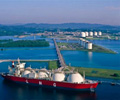USTR cuts LNG shipping fines from maritime restrictions

The US Trade Representative has dropped a proposal to suspend LNG export permits if operators fail to meet requirements to transport some exports on US vessels.
But U.S. LNG producers remain concerned that the requirement for U.S. exporters to ship LNG in U.S.-built vessels is unenforceable, and could potentially create a bigger hurdle than the year-long suspension of the federal LNG export review in 2024 under the Biden administration, according to the LNG industry’s leading trade group, the Center for Liquefied Natural Gas.
“This is more problematic than a pause,” Charlie Riedl, the center’s executive director, told attendees at the LDC Gas Forum’s Gulf Coast Energy Forum in New Orleans on Oct. 13.
USTR on October 10 announced changes to maritime restrictions first announced in March, targeting China’s maritime influence and seeking to promote US shipbuilding.
Among the new changes, USTR eliminated the most punitive aspect for LNG exporters – a provision indicating that the penalty for non-compliance could be suspension of export permits.
“This modification will avoid potential short-term disruption to the LNG sector while encouraging investment in US shipbuilding capacity and LNG production. [ships]” the USTR notice said.
The new version maintains the scheduled phase-in stages proposed in June, without detailing the enforcement mechanism.
US-flagged and operated vessels will still need to deliver 1% of LNG exports starting in 2028. After that, shipping requirements using US-built, flagged and operated vessels will begin at 1% in 2029, based on total exports in the previous calendar year. Then, the requirements increase over time, rising to 2% in April 2031 and continuing to increase to 15% in April 2047.
LNG trade groups have warned that it is impossible for the industry to comply because no existing ships can meet the requirements, nor does the US have shipyards that can build them before the mandate takes effect.
The Biden-era export permit moratorium primarily impacted half a dozen proposed US LNG projects, delaying developers’ efforts to advance the projects to the construction stage before President Donald Trump ended the permit freeze. But maritime restrictions will impact projects that are already exporting, Riedl said.
“We would not be able to build an LNG ship in time to meet these requirements even if the runway were as long as we are talking about,” Riedl said. “It will take a long time to equip US shipyards.”
US shipyards are not large enough to build LNG carriers, and the largest shipyards are facing a backlog of military ships that are behind schedule, Riedl added.
The trade group described USTR’s removal of the LNG export permit suspension provision as a “welcome step in the right direction.” However, they advocate the complete removal of LNG tankers from maritime restrictions.
Restrictions on LNG vessels are inconsistent with the Trump administration’s efforts to increase US LNG exports, said Rick Smead, managing director of consulting services at RBN Energy, speaking on a panel in New Orleans.
“They have competing goals [Section] 301—’America First’—and we’re going to dominate world LNG—’America First,’” Smead said at the conference. “And it’s hard to do both at the same time, unless you’re talking very fast.”
These new requirements arise from a broader investigation under Section 301 of the US Trade Act of 1974 into “China targeting the maritime, logistics and shipbuilding sectors for dominance.”
As part of those efforts, the US in April announced fees for Chinese ship operators and owners, and China launched retaliatory measures, including port fees for US-linked vessels.
In addition to changes affecting LNG exports, USTR on October 10 proposed cutting service fees for certain ethane and LPG carriers under long-term leases.
The USTR notice described LNG exports as an important contributor to the US economy and stated that the agency would closely monitor the availability of such vessels.
The agency pledged to “enhance the competitiveness and resilience of the U.S. LNG industry in a manner consistent with U.S. policy objectives, including through additional measures designed to support the expansion of the U.S. shipbuilding sector,” according to the notice.
Source: Platts
